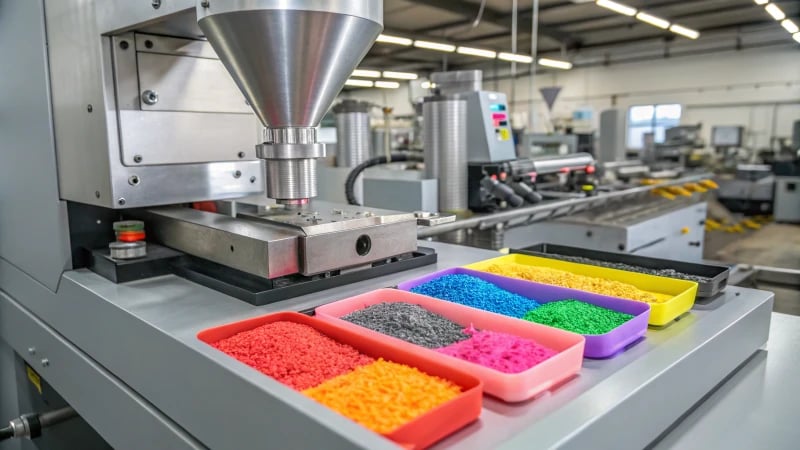MANUFACTURING
blog & article
read our latest newsletter
Whether you’re curious about material selection, product design, mold design, mold making and injection molding, feel free to ask us anything. Our team is ready to provide the guidance and insights you need.

How Can Injection Molding Machines Be Used to Manufacture Phone Cases?
Discover how injection molding machines manufacture phone cases by heating plastic pellets, injecting them into molds, and maintaining strict quality control. This process involves precise mold design, material selection like TPU or PC, and rigorous inspections to ensure each case ...
MANUFACTURING

How Do Injection Molding Machines Produce Water Tanks?
This article explores how injection molding machines produce water tanks, detailing the intricate processes involved from mold design to material selection. It highlights the importance of choosing suitable thermoplastics like HDPE and PP for their durability and chemical resistance. The ...
MANUFACTURING

How Can Injection Molding Revolutionize the Production of Food Containers?
Injection molding is transforming the production of food containers by enhancing efficiency and sustainability. This process utilizes food-grade plastics like polypropylene and high-density polyethylene to create durable, safe containers that comply with FDA regulations. Key considerations include selecting appropriate materials, ...
MANUFACTURING

How Can Injection Molding Machines Be Used to Manufacture Flower Pots?
This article explores how injection molding machines are utilized to manufacture flower pots. It details the process of designing custom molds, selecting appropriate materials like polypropylene and HDPE, and the efficient injection-molding method that produces consistent, high-quality pots. The advantages ...
MANUFACTURING

How Are Toothbrushes Made Using Injection Molding Machines?
This article explores the fascinating process of toothbrush manufacturing through injection molding. It details how complex molds are designed to create ergonomic handles and heads, the selection of thermoplastic materials like polypropylene for durability and flexibility, and the precise injection ...
MANUFACTURING

How Can an Injection Molding Machine Be Used to Make Helmets?
This article explores how injection molding machines are used to manufacture helmets. It covers material selection, including polycarbonate and ABS for their impact resistance and cost-effectiveness. The importance of mold design is highlighted, detailing how molds must conform to the ...
MANUFACTURING

How Can an Injection Molding Machine Create a Toy Car?
This article explores how injection molding machines manufacture toy cars. It details the critical steps involved: designing molds for car bodies, wheels, and axles; selecting appropriate plastics like ABS and PMMA; executing the injection molding process by melting pellets and ...
MANUFACTURING

Can Injection Molding Machines Produce Both PPR and PVC Fittings?
This article explores how injection molding machines can produce both PPR (polypropylene random copolymer) and PVC (polyvinyl chloride) fittings. It highlights the advantages of using injection molding for each material, detailing the unique process requirements for optimal production. For PPR, ...
MANUFACTURING

Die Casting vs. Injection Moulding: What Are the Key Differences?
This article explores the key differences between die casting and injection moulding, two essential manufacturing processes. Die casting primarily uses non-ferrous metals like aluminum and zinc, requiring high temperatures and pressures to create strong, precise components. In contrast, injection moulding ...
MANUFACTURING

How Efficiently Can an Injection Molding Machine Produce PVC Fittings?
This article explores how injection molding machines produce PVC fittings with efficiency. It highlights the importance of material compatibility, custom mold design, and process control in achieving high-quality outputs. Additionally, it addresses challenges such as heat stability and the need ...
MANUFACTURING

What Are the Steps to Calculate Shot Weight in Injection Molding?
Calculating shot weight in injection molding is essential for optimizing material use and product quality. This guide outlines the steps to determine shot weight using theoretical methods—calculating part volume with geometric formulas—and practical approaches like machine metering systems or weighing ...
MANUFACTURING

How Do Plastic Injection Molding Machines Create Eyeglasses?
This article explores how plastic injection molding machines are used to manufacture eyeglass frames. It details the importance of precise mold design and material selection, highlighting polycarbonate's benefits for durability and style. While frames are efficiently produced through this process, ...
MANUFACTURING

How Does an Injection Molding Machine Create a Keyboard?
This article explores the intricate process of how injection molding machines manufacture keyboards. It details the steps involved in creating keycaps and bases using materials like ABS and polycarbonate. From designing molds to selecting appropriate materials, melting plastics, and assembling ...
MANUFACTURING

How Can You Produce an Egg Tray Using an Injection Molding Machine?
Discover the fascinating process of producing egg trays with injection molding. This article delves into essential aspects such as mold design, including cavity shape and ejection systems, material selection between polystyrene and polypropylene, and the detailed steps of the injection ...
MANUFACTURING

How Do Injection Molding Machines Manufacture Rulers?
The process of manufacturing rulers through injection molding involves several intricate steps. It begins with designing a custom mold that shapes the ruler and engraves precise measurements. The right thermoplastic material, such as Acrylonitrile Butadiene Styrene (ABS) or Polypropylene (PP), ...
MANUFACTURING

How Do Injection Molding Machines Produce Bottle Caps?
The process of producing bottle caps using injection molding involves designing precise molds, selecting suitable materials like polypropylene, and employing an injection machine to shape the caps. Quality control is crucial to ensure each cap meets industry standards. After molding, ...
MANUFACTURING

How Do Injection Molding Machines Create Plastic Flowers?
This article explores how injection molding machines bring plastic flowers to life. It delves into the importance of mold design, material selection, and the operational process involved in creating these lifelike floral components. The piece highlights the significance of choosing ...
MANUFACTURING

What Size Injection Molding Machine is Needed for an Air Conditioning Shell?
Selecting the appropriate injection molding machine for air conditioning shells involves evaluating several factors including shell dimensions, structural complexity, material type, and mold cavity count. Machines generally require clamping forces between 650 to 1350 tons. Larger or more complex shells ...
MANUFACTURING

How Much Capacity Does a Plastic Injection Molding Machine Have?
This article explores the essential factors determining the capacity of plastic injection molding machines: clamping force, shot volume, and production rate. Clamping force is vital for maintaining mold integrity during injection; small machines typically exert 5-10 tons while large industrial ...
MANUFACTURING

How Can an Injection Molding Machine Produce Plastic Spoons?
This article explores the fascinating process of producing plastic spoons using injection molding machines. It details how these machines melt plastic pellets and inject molten plastic into spoon-shaped molds under high pressure. The method ensures high precision and efficiency while ...
MANUFACTURING

How Do You Determine the Capacity of a Plastic Injection Molding Machine?
Understanding the capacity of plastic injection molding machines involves three key factors: clamping force, shot volume, and production rate. Clamping force, measured in tons, ensures molds remain closed during injection to prevent defects. Shot volume indicates the maximum amount of ...
MANUFACTURING

Can One Injection Molding Machine Fit Any Mold?
This article explores why one injection molding machine cannot fit every mold. It discusses critical factors such as clamping force, injection capacity, mold size, and pressure requirements that influence compatibility. Understanding these elements is crucial for product designers to avoid ...
MANUFACTURING

What Are the Most Common Surface Finishing Techniques for Injection Molded Parts?
This article delves into the most common surface finishing techniques for injection molded parts, such as painting, electroplating, hot stamping, silk screening, pad printing, laser engraving, frosting, and polishing. Each method is designed to enhance both the appearance and performance ...
MANUFACTURING

How Does the Injection Rate Affect Injection Molding Efficiency?
Understanding the injection rate is crucial in injection molding as it directly impacts part quality, surface finish, and overall efficiency. A well-calibrated injection rate ensures complete mold filling while minimizing defects such as air entrapment or short shots. Factors influencing ...
MANUFACTURING

What Challenges Do Startups Face in Injection Molding?
Startups entering the injection molding industry encounter significant hurdles, including exorbitant equipment and mold costs, difficulties in attracting skilled talent, and intense market competition. These challenges necessitate careful strategic planning and effective resource management to ensure growth and sustainability. Funding ...
MANUFACTURING

How Can You Texture Injection Molded Surfaces Effectively?
This article delves into various methods for effectively texturing injection molded surfaces. Techniques such as Electrical Discharge Machining (EDM), chemical etching, laser texture processing, and mechanical engraving are explored. Each method offers unique benefits tailored to specific design needs and ...
MANUFACTURING

What Impact Do RoHS Directives Have on Injection Molding Materials?
The RoHS Directive significantly influences injection molding materials by enforcing strict restrictions on hazardous substances like heavy metals and brominated flame retardants. This shift compels manufacturers to seek alternative, compliant materials, often leading to increased production costs due to higher ...
MANUFACTURING

What Are the Steps to Comply with REACH Regulations in Injection Molding?
Navigating REACH compliance in injection molding is crucial for product safety and market access. This article provides a comprehensive overview of the necessary steps, including selecting compliant materials, managing suppliers effectively, maintaining rigorous process controls, and keeping detailed records. By ...
MANUFACTURING

What Are the Key Steps to Transition from Prototype to Mass Production in Injection Molding?
This article outlines the essential steps for transitioning from prototype to mass production in injection molding. Key stages include thorough evaluation of prototypes, optimization of molds based on performance tests, standardization of process parameters through experimental design methods, and establishment ...
MANUFACTURING

What Are the Key DFM Principles for Optimizing Injection Mold Design?
This article explores essential Design for Manufacturing (DFM) principles crucial for optimizing injection mold design. It emphasizes the importance of simplifying mold structures, strategically placing gates, designing efficient cooling systems, selecting appropriate materials, and ensuring precise processing. Each principle plays ...
MANUFACTURING

